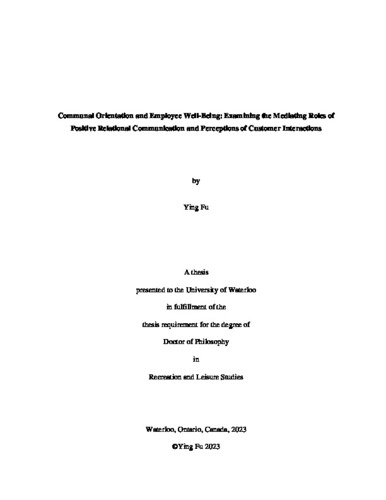| dc.contributor.author | Fu, Ying | |
| dc.date.accessioned | 2023-06-15 15:55:13 (GMT) | |
| dc.date.available | 2023-06-15 15:55:13 (GMT) | |
| dc.date.issued | 2023-06-15 | |
| dc.date.submitted | 2023-06-07 | |
| dc.identifier.uri | http://hdl.handle.net/10012/19539 | |
| dc.description.abstract | Customer interactions can be a significant source of work-related stress for hospitality employees, which can lead to burnout and high employee turnover rates. However, adopting a communal approach to customer relationships may help reduce these stressors. This approach involves caring for others based on their needs and welfare, with less expectation of return. To investigate the potential benefits of having a communal orientation in the hospitality industry, the present study conducted a survey among 610 hospitality frontline employees in Hainan Island, China and examined the relationship between communal orientation and well-being outcomes. Additionally, the study investigated potential mediating mechanisms that could explain this relationship. Results suggested that higher levels of employee communal orientation were associated with lower burnout, greater work engagement, higher job satisfaction, and greater life satisfaction. These associations were all explained by employees’ perceived intimacy during customer interactions. Perceived social orientation also accounted for the positive association between communal orientation and work engagement. However, employee perceived information seeking suppressed the potential positive effect of communal orientation on the need for recovery. Positive relational communication behaviours did not explain the association between communal orientation and well-being.
These findings contribute to the relationship literature by providing important evidence for the advantages of having a communal orientation in business relationship contexts. The findings suggest that hospitality managers can enhance employee well-being by acknowledging the significance of communal orientation and relationship intimacy. To achieve this, the managers could explore effective solutions such as frontline recruitment, intimacy-enhancing interventions, and investment in employee well-being. | en |
| dc.language.iso | en | en |
| dc.publisher | University of Waterloo | en |
| dc.subject | communal orientation | en |
| dc.subject | employee well-being | en |
| dc.subject | relationship intimacy | en |
| dc.subject | hospitality | en |
| dc.title | Communal Orientation and Employee Well-Being: Examining the Mediating Roles of Positive Relational Communication and Perceptions of Customer Interactions | en |
| dc.type | Doctoral Thesis | en |
| dc.pending | false | |
| uws-etd.degree.department | Recreation and Leisure Studies | en |
| uws-etd.degree.discipline | Recreation and Leisure Studies | en |
| uws-etd.degree.grantor | University of Waterloo | en |
| uws-etd.degree | Doctor of Philosophy | en |
| uws-etd.embargo.terms | 0 | en |
| uws.contributor.advisor | Potwarka, Luke | |
| uws.contributor.advisor | Mock, Steven | |
| uws.contributor.affiliation1 | Faculty of Health | en |
| uws.published.city | Waterloo | en |
| uws.published.country | Canada | en |
| uws.published.province | Ontario | en |
| uws.typeOfResource | Text | en |
| uws.peerReviewStatus | Unreviewed | en |
| uws.scholarLevel | Graduate | en |

